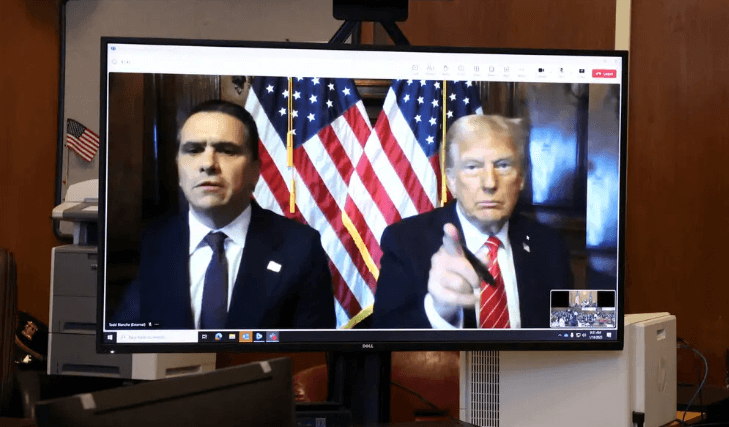特朗普在纽约刑事案件中被判刑,将避免入狱

【中美创新时报2025 年 1 月 10 日编译讯】(记者温友平编译)周五上午,特朗普这位当选总统无条件获释,正式确立了他重罪犯的身份,也使他成为第一位带着这一身份入主白宫的人。他曾竭尽全力避免入狱。《纽约时报》记者Ben Protess 和 Jonah E. Bromwich对此作了下述报道。
经过数月的拖延,当选总统唐纳德·J·特朗普 (Donald J. Trump) 的纽约刑事案件于周五落下帷幕,这位美国前任和未来总统避免了入狱,但却成为了重罪犯。
审判法官胡安·M·默坎 (Juan M. Merchan) 在特朗普的宣判中表示:“本法庭从未遇到过如此独特和非凡的情况。”“这确实是一个非同寻常的案件。”
然后,他实施了所谓的无条件释放特朗普的刑罚,这是监禁或缓刑的罕见且宽大的替代方案。在解释宽大处理时,麦钱法官承认特朗普将于 10 天后就职。
默坎法官表示,“普通公民唐纳德·特朗普和刑事被告唐纳德·特朗普”无权获得总统职位的保护,他解释说,只有总统职位才能保护被告免受判决的严重性。
“本法院已裁定,唯一允许作出有罪判决而不侵犯最高职位的合法判决是无条件释放,”默坎法官说。
然后,他祝特朗普“一路平安”,并离开了法庭。
尽管宽大处理,但这一程序具有象征意义:它正式确立了特朗普的重罪犯身份,使他成为第一个将这一可疑称号带入总统职位的人。
特朗普以虚拟方式出庭,他的怒容投射到曼哈顿下城法庭的屏幕上,法庭内冷清明亮,挤满了记者、素描艺术家和曼哈顿地区检察官阿尔文·布拉格。这位当选总统在佛罗里达州的海湖庄园与他的一名律师坐在一对巨大的美国国旗前。
“这是一次非常可怕的经历,”特朗普在听证会上说,并补充道:“事实上,我完全无辜。”
他强调选举比判决更重要,并表示选民“亲眼目睹了这一切”。
此次判决源于特朗普因伪造记录掩盖性丑闻而被定罪,这一丑闻威胁到他的首次竞选。陪审团于 5 月判定特朗普所有 34 项重罪成立后,他竭尽全力避免宣判,但周四最高法院驳回了他阻止宣判的努力。
听证会开始时,首席检察官 Joshua Steinglass 重述了“压倒性证据”,并表示检方建议特朗普无条件释放。
但斯坦格拉斯仍然猛烈抨击特朗普,称“被告非但没有对自己的犯罪行为表示任何悔意,反而故意煽动人们对我们的制度和法治的蔑视。”
他补充说,特朗普“对公众对刑事司法系统的看法造成了持久的损害,并使法院官员处于危险之中。”
特朗普的律师托德·布兰奇表示他“非常”不同意。他猛烈抨击了该案的合法性,重复了特朗普经常声称的这相当于干预选举的说法。
他说,这对特朗普的家人和国家来说都是“悲伤的一天”。
既然特朗普已经被判刑,他可以开始正式上诉。然而,他不能赦免自己。总统的赦免权并不适用于州指控。
以下是关于特朗普判刑的相关信息:
案件:去年春天,经过七周的审判,由 12 名纽约人组成的陪审团判定特朗普犯有 34 项伪造商业记录的重罪。该案源于 2016 年向色情明星 Stormy Daniels 支付的封口费,当时后者正在出售她与特朗普的性接触故事。如果 Daniels 女士公开此事,她可能会在特朗普 2016 年竞选的最后几天引发丑闻。陪审团得出结论,特朗普向他的中间人 Michael D. Cohen 偿还了封口费,然后指示伪造记录以保密付款。
惩罚:特朗普曾面临长达四年的监禁,但他的选举胜利使监禁成为现实和宪法上的不可能。他的无条件释放没有任何附加条件。
一个令人惊讶的决定:本月,特朗普的律师多次向纽约州法院提出停止诉讼的请求,但均以失败告终,这导致他向美国最高法院寻求紧急缓刑。但周四,最高法院驳回了特朗普的请求,这是最高法院在其他案件中似乎同情特朗普的独立性表现,令人惊讶。
题图:唐纳德·J·特朗普出现在电脑显示器上,与他的律师坐在一起。当选总统唐纳德·J·特朗普 (Donald J. Trump) 以虚拟方式出席了宣判,去年他被判犯有 34 项伪造商业记录以掩盖性丑闻的罪名,该丑闻威胁到他 2016 年的竞选活动。图片来源:Brendan Mcdermid,Pool,路透社
附原英文报道:
Trump Is Sentenced in N.Y. Criminal Case and Will Avoid Jail
The president-elect received an unconditional discharge of his sentence, which formalizes his status as a felon and makes him the first to carry that distinction into the White House. He had fought to avoid the proceeding at every turn.
ImageDonald J. Trump appears on a computer monitor, sitting alongside his lawyer.
President-elect Donald J. Trump, who appeared virtually at his sentencing, was convicted last year of 34 counts of falsifying business records to cover up a sex scandal that threatened to derail his 2016 campaign.Credit…Brendan Mcdermid, Pool, via Reuters
Jan. 10, 2025, 10:49 a.m. ET
Ben Protess and Jonah E. Bromwich
After months of delay, President-elect Donald J. Trump’s New York criminal case culminated on Friday with the nation’s former and future president avoiding jail, but becoming a felon.
“Never before has this court been presented with such a unique and remarkable set of circumstances,” the trial judge, Juan M. Merchan, said at Mr. Trump’s sentencing. “This has been truly an extraordinary case.”
He then imposed a so-called unconditional discharge of Mr. Trump’s sentence, a rare and lenient alternative to jail or probation. Explaining the leniency, Justice Merchan acknowledged Mr. Trump’s inauguration 10 days hence.
“Donald Trump the ordinary citizen, Donald Trump the criminal defendant” would not be entitled to the protections of the presidency, Justice Merchan said, explaining that only the office shielded the defendant from the verdict’s gravity.
“This court has determined that the only lawful sentence that permits entry of judgment of conviction without encroaching on the highest office of the land is an unconditional discharge,” Justice Merchan said.
He then wished Mr. Trump “godspeed” and departed the bench.
Despite the lenience, the proceeding carried symbolic importance: It formalized Mr. Trump’s status as a felon, making him the first to carry that dubious designation into the presidency.
Mr. Trump appeared virtually, his scowl projected onto a screen in a chilly and bright Lower Manhattan courtroom filled with reporters, sketch artists and the Manhattan district attorney, Alvin L. Bragg. The president-elect was at his Mar-a-Lago estate in Florida, seated along with one of his lawyers in front of a pair of large American flags.
“This has been a very terrible experience,” Mr. Trump said during the hearing, adding: “The fact is, I’m totally innocent.”
Asserting the primacy of the election over the verdict, he said that the voters “got to see this firsthand.”
The sentencing resulted from Mr. Trump’s conviction on charges of falsifying records to cover up a sex scandal that threatened to derail his first campaign. Once the jury convicted Mr. Trump on all 34 felony counts in May, he fought tooth and nail to avoid the spectacle of a sentencing, but on Thursday the Supreme Court rejected his effort to block it.
The hearing began with a lead prosecutor, Joshua Steinglass, recapping the “overwhelming evidence” and saying that the prosecution had recommended that Mr. Trump receive the unconditional discharge.
But Mr. Steinglass still blasted Mr. Trump, saying that “far from expressing any kind of remorse for his criminal conduct, the defendant has purposefully bred disdain for our institutions and the rule of law.”
Mr. Trump, he added, “has caused enduring damage to public perception of the criminal justice system and has placed officers of the court in harm’s way.”
Mr. Trump’s lawyer, Todd Blanche, said he “very much” disagreed. He blasted the legitimacy of the case, repeating Mr. Trump’s frequent claims that it amounted to election interference.
He said it was a “sad day” for Mr. Trump’s family — and the country.
Now that Mr. Trump has been sentenced, he can begin a formal appeal of his conviction. He cannot, however, pardon himself. Presidential pardon authority does not extend to state charges.
Here’s what to know about Mr. Trump’s sentencing:
The case: After a seven-week trial last spring, a jury of 12 New Yorkers convicted Mr. Trump on 34 felony counts of falsifying business records. The case arose from a 2016 hush-money payment to a porn star, Stormy Daniels, who was selling her story of a sexual encounter with Mr. Trump. Had she gone public, Ms. Daniels might have triggered a scandal in the final days of Mr. Trump’s 2016 campaign. Mr. Trump, the jury concluded, reimbursed his fixer, Michael D. Cohen, for the hush money and then directed that records be falsified to keep the payment under wraps.
The punishment: Mr. Trump had faced up to four years in prison, but his election victory made incarceration a practical and constitutional impossibility. His unconditional discharge comes with no strings attached.
A surprising decision: This month, Mr. Trump’s lawyers filed repeated requests in New York State Court to halt the proceeding, all of which failed, leading him to seek an emergency reprieve from the U.S. Supreme Court. But the high court on Thursday denied Mr. Trump’s request, a surprising show of independence from a court that has appeared sympathetic to Mr. Trump in other cases.

